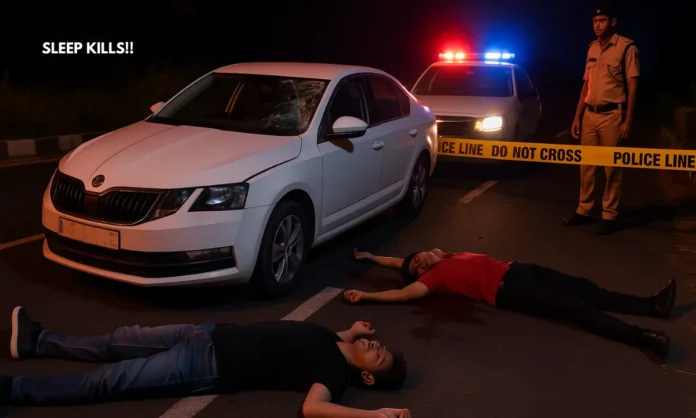Three-Point Summary:
- A civil engineer in Gurugram fatally hit a law student and seriously injured another after falling asleep at the wheel near a highway eatery.
- The accident, captured on CCTV, has reignited concerns over fatigue-induced driving—an underreported cause of road fatalities in India.
- Similar recent incidents, including a Noida businessman’s death in a cab, point to systemic neglect of driver welfare, legal accountability, and road safety norms.
Drowsy Highways, Deadly Consequences: Why the Gurugram Crash Demands Attention
When 24-year-old Harsh, a law student, stood chatting with a friend outside Chanchal Dhaba in the early hours of June 24, death was the last thing on his mind. But within seconds, a speeding Skoda sedan veered off course and violently flung him and his friend nearly 10 metres across the service lane. Harsh didn’t survive. His friend lies critically injured. The driver, a 31-year-old civil engineer named Mohit, confessed he fell asleep behind the wheel.
This incident, captured in a now-viral CCTV clip, is not just another blip in India’s tragic road fatality statistics. It’s a symptom of a much larger issue—sleep-deprived drivers navigating poorly regulated roads under impossible schedules. In a country where over 150,000 people die in road accidents annually, fatigue is rarely spotlighted as a cause. This must change.
Horrifying hit & run case on NH-48 service lane in Gurugram. A Skoda Rapid veered off course, accelerates, rams guard rails & two LLB students, killing one of them instantly at spot. A commuter chased the Skoda & recorded its Reg no.@HTGurgaon @htTweets @leenadhankhar pic.twitter.com/o6eLuwEs2z
— Debashish Karmakar (@DebashishHT) June 25, 2025
Fatigue: The Underestimated Killer on Indian Roads
- Sleep-deprived driving remains vastly underreported in India’s crash investigations.
- Long commutes, poor work-life balance, and lack of awareness about fatigue-related impairment worsen the crisis.
- The absence of roadside checks for drowsiness mimics drunk driving’s early days of unchecked damage.
According to data from the Ministry of Road Transport and Highways, most accident reports cite “speeding” or “driver negligence” but seldom dig deeper into causes like driver exhaustion. Yet, studies from AIIMS and IIT Delhi suggest that fatigue can impair reaction time and decision-making as severely as alcohol.
Mohit, the civil engineer responsible for Harsh’s death, had reportedly been returning from a long work shift. Like many in his profession, his schedule blurred day and night. There are no mandated rest hours for private employees commuting via car. And unlike commercial transport, private vehicle operators face no checks for overwork or fatigue.
This legal grey zone enables deadly lapses. The tragic similarity to another recent case—in which a Noida businessman died after his cab driver fell asleep—underlines how pervasive the issue is.
Legal Loopholes and Enforcement Gaps
- Current Motor Vehicles Act lacks explicit provisions against fatigue-induced driving.
- Enforcement focuses on alcohol and speed but ignores driver wellness and rest regulation.
- Civil liability is poorly enforced, and compensation for victims remains meagre and delayed.
India’s Motor Vehicles Act, 1988, last amended in 2019, ramps up penalties for drunk driving, overloading, and rash driving—but does not classify sleep-deprived driving as a punishable offence. This omission creates a blind spot where well-meaning citizens like Mohit may not face adequate deterrence or responsibility.
Moreover, the lack of structured civil remedies for victims’ families compounds the tragedy. Harsh’s family must now fight a bureaucratic battle for justice—one where insurance firms, procedural delays, and vague liability laws can stretch into years.
The CCTV footage may help expedite charges, but without codified fatigue parameters in law, prosecution hinges on circumstantial evidence and confession. Had the incident not been caught on camera, the case might’ve ended as another generic “driver negligence” filing.
A Cultural Shift Needed in Road Safety Advocacy
- Current Motor Vehicles Act lacks explicit provisions against fatigue-induced driving.
- Enforcement focuses on alcohol and speed but ignores driver wellness and rest regulation.
- Civil liability is poorly enforced, and compensation for victims remains meagre and delayed.
We are conditioned to fear speeding or drunk driving, but not the silent threat of exhaustion. This cultural oversight persists in driver training, corporate protocols, and policymaker priorities.
Ride-hailing companies like Ola and Uber have no mandatory “cool-off” periods after consecutive bookings. Corporate professionals frequently take red-eye flights followed by highway rides to offices, with no checks in place. The idea that mental exhaustion could kill—just as surely as a bottle of whisky—has not taken root.
That’s why Harsh’s death matters. It must become a case study for how India treats sleep as a public health and public safety issue.
Final Verdict: Driving While Asleep Is Still Driving to Kill
The tragic death of a law student in Gurugram after a civil engineer fell asleep at the wheel is not just a local accident—it is a national warning siren. Sleep-deprived driving, though alarmingly common, remains legally and culturally invisible in India’s road safety discourse. Unlike drunk driving, there are no roadside checks, no media campaigns, and no accountability mechanisms to prevent drowsy motorists from becoming killers.
This case, caught on CCTV and confirmed by the driver’s own confession, exposes a systemic neglect in our laws and corporate norms. Long work hours, overnight travel, and absence of mandatory rest periods are combining to create a perfect storm on our highways. And while public outrage often erupts around luxury car crashes or celebrity involvement, incidents like Harsh’s death—quiet, brutal, and all too preventable—fade quickly from public memory.
The law must evolve. The Motor Vehicles Act must recognize sleep-induced driving impairment as a punishable offence. Companies must be held accountable for employee commute policies. And above all, public consciousness must shift to view fatigue as a dangerous condition—no different from intoxication.
India cannot afford to keep dismissing such deaths as “driver negligence.” The real negligence lies in our refusal to see sleep as a matter of life and death.


